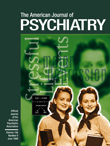Dr. Thiel Replies
To the Editor: My colleagues and I thank Edward J. Cumella, Ph.D., for commenting on our study, and we agree with him when he says that the statistical power is too low for detecting a difference of small effect size. However, we cannot agree with his statement that the trends in our data suggest an opposite conclusion to that offered in our discussion.
The initial results of our study regarding the prevalence of concomitant obsessive-compulsive disorder (OCD) in anorexia and bulimia nervosa, which were published 4 years ago (1), showed that the patients with an eating disorder and concomitant OCD scored significantly higher than patients with no OCD on several subscales of the Eating Disorder Inventory, indicating a higher degree of pathological attitudes about eating. These data suggest that this comorbidity was correlated with the severity of the eating disorder before treatment.
In the more recent article, we present the follow-up results of the second assessment 30 months later. Again, the patients with concomitant OCD showed a higher degree of pathology. However, analysis of variance for repeated measures revealed significant improvement over time in both groups, with and without concomitant OCD, and there were no significant group-by-time interactions. In our opinion, the results suggest a certain degree of independence between the improvement over time and the comorbidity of the eating disorder and OCD. Concomitant OCD does not indicate a significantly poorer prognosis for patients with eating disorders. Nevertheless, we share the opinion of Dr. Cumella that a study with a larger N value would be desirable.
1. Thiel A, Broocks A, Ohlmeier M, Jacoby GE, Schüßler G: Obsessive-compulsive disorder among patients with anorexia nervosa and bulimia nervosa. Am J Psychiatry 1995; 152:72–75Link, Google Scholar



